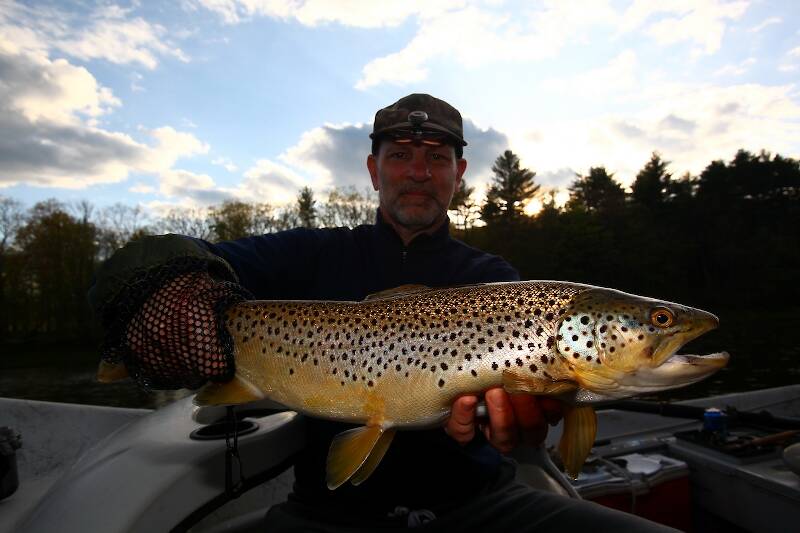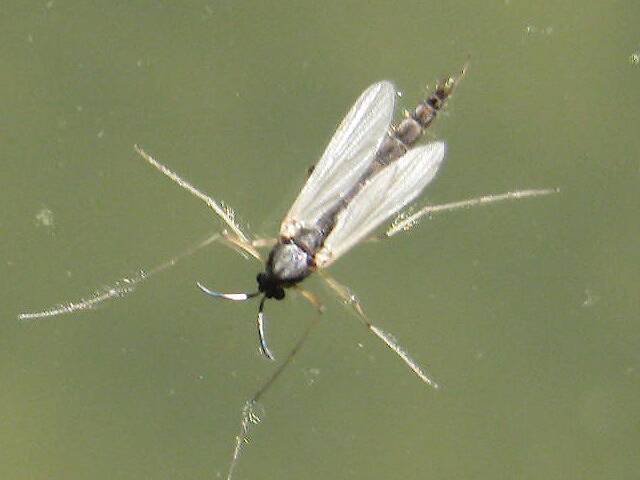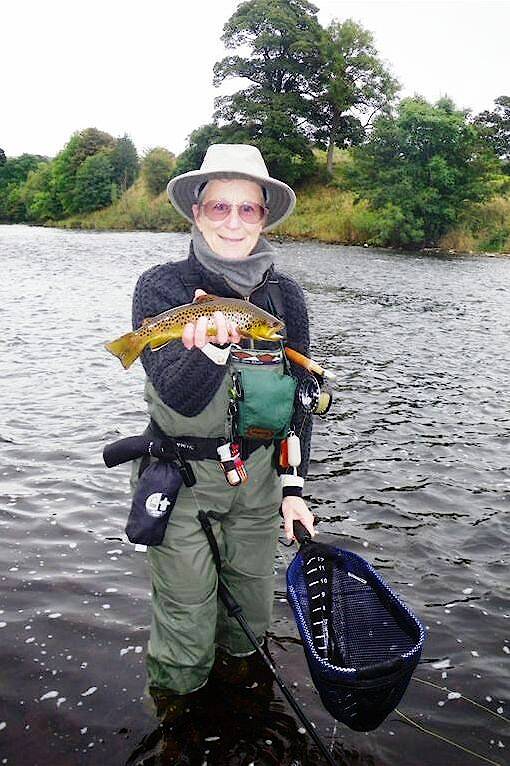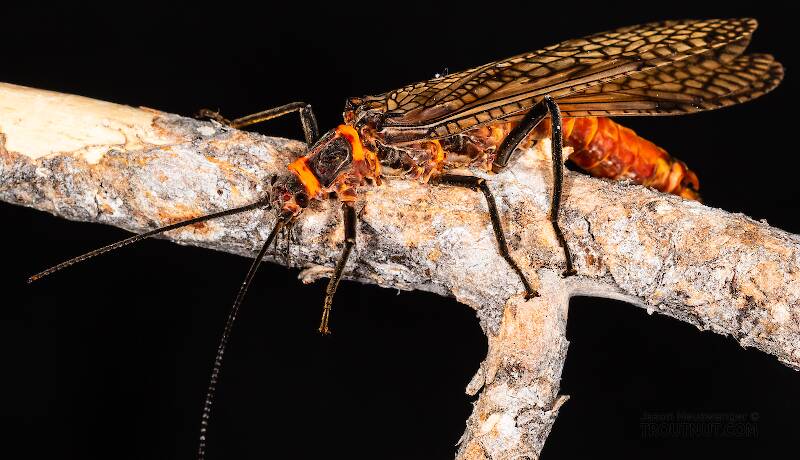
Salmonflies
Pteronarcys californica
The giant Salmonflies of the Western mountains are legendary for their proclivity to elicit consistent dry-fly action and ferocious strikes.
Featured on the forum
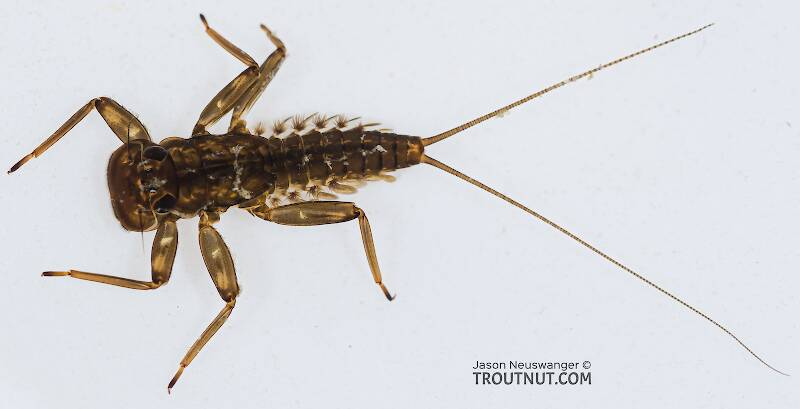
This specimen keys to the Epeorus albertae group of species. Of the five species in that group, the two known in Washington state are Epeorus albertae and Epeorus dulciana. Of the two, albertae has been collected in vastly more locations in Washington than dulciana, suggesting it is far more common. On that basis alone I'm tentatively putting this nymph in albertae, with the large caveat that there's no real information to rule out dulciana.

Troutnut is a project started in 2003 by salmonid ecologist Jason "Troutnut" Neuswanger to help anglers and
fly tyers unabashedly embrace the entomological side of the sport. Learn more about Troutnut or
support the project for an enhanced experience here.
Martinlf on Feb 21, 2007February 21st, 2007, 8:31 am EST
You say caley-BEE-tis; I say caley-BAY-tis.
You say moo-TILL-li-dee; I say moo-TILL-li-day.
caley-BEE-tis; caley-BAY-tis,
moo-TILL-li-dee; moo-TILL-li-day.
Let's call the whole thing off.
You say moo-TILL-li-dee; I say moo-TILL-li-day.
caley-BEE-tis; caley-BAY-tis,
moo-TILL-li-dee; moo-TILL-li-day.
Let's call the whole thing off.
"He spread them a yard and a half. 'And every one that got away is this big.'"
--Fred Chappell
--Fred Chappell
Falsifly on Feb 21, 2007February 21st, 2007, 9:30 am EST
Ok Taxon I will bite.
I hope not to get stung.
Will someone please inform this neophyte.
The relevence to fishing.
For I have none.
With all due respect I use the term neophyte in reference to myself.
I hope not to get stung.
Will someone please inform this neophyte.
The relevence to fishing.
For I have none.
With all due respect I use the term neophyte in reference to myself.
Falsifly
When asked what I just caught that monster on I showed him. He put on his magnifiers and said, "I can't believe they can see that."
When asked what I just caught that monster on I showed him. He put on his magnifiers and said, "I can't believe they can see that."
Taxon on Feb 21, 2007February 21st, 2007, 10:34 am EST
Louis-
Call it off, ah yah, sure,
since a stalemate, as it were.
Falsifly-
Relevance to fishing did you say?
My response to that must be nay.
Call it off, ah yah, sure,
since a stalemate, as it were.
Falsifly-
Relevance to fishing did you say?
My response to that must be nay.
Martinlf on Feb 21, 2007February 21st, 2007, 11:02 am EST
Taxon, you know the Gershwin song, right? Well, do you think they called the whole thing off?
Falsifly, fishing? What's that?
Falsifly, fishing? What's that?
"He spread them a yard and a half. 'And every one that got away is this big.'"
--Fred Chappell
--Fred Chappell
Taxon on Feb 21, 2007February 21st, 2007, 1:04 pm EST
Louis-
Right. Probably not. However, it does sound like one of the parties might have been leaning toward submission, which was so distasteful that it might have been a rather drawn-out process.
Right. Probably not. However, it does sound like one of the parties might have been leaning toward submission, which was so distasteful that it might have been a rather drawn-out process.
Martinlf on Feb 21, 2007February 21st, 2007, 3:10 pm EST
Submit?
Never!
Never!
"He spread them a yard and a half. 'And every one that got away is this big.'"
--Fred Chappell
--Fred Chappell
Taxon on Feb 21, 2007February 21st, 2007, 4:15 pm EST
Louis-
Never would be a mighty long commitment.
Never would be a mighty long commitment.
GONZO on Feb 22, 2007February 22nd, 2007, 3:06 am EST
You guys are killing me! While I take no stand on the pronunciation issue, the debate is hilarious.
I do not know which way to say
moo-TILL-li-dee, moo-TILL-li-day.
But I will bet (for all who care)
that interest in this small affair
is idle fun and baited snare.
The fish we seek don't care a whit.
It will not change their minds one bit.
With all these words, we prove once more
what's in a name is naught for sure--
it's just a way of keeping score!
I do not know which way to say
moo-TILL-li-dee, moo-TILL-li-day.
But I will bet (for all who care)
that interest in this small affair
is idle fun and baited snare.
The fish we seek don't care a whit.
It will not change their minds one bit.
With all these words, we prove once more
what's in a name is naught for sure--
it's just a way of keeping score!
Martinlf on Feb 22, 2007February 22nd, 2007, 5:28 am EST
"5-7-5"
A bite? No, double!
The knot will hold I am sure:
Well-tied ligature.
"He spread them a yard and a half. 'And every one that got away is this big.'"
--Fred Chappell
--Fred Chappell
GONZO on Feb 22, 2007February 22nd, 2007, 5:53 am EST
OK, Louis, you have me stumped with the cryptic numerology. As for the rest...
This doggerel is easy stuff,
And hard to stop--I cry "Enough!"
My sides are sore. I, laughing, say,
"I might not last another day!"
This doggerel is easy stuff,
And hard to stop--I cry "Enough!"
My sides are sore. I, laughing, say,
"I might not last another day!"
CaseyP on Feb 22, 2007February 22nd, 2007, 6:32 am EST
Martin hooks us all
With little Japanese fly
We fall down laughing
With little Japanese fly
We fall down laughing
"You can observe a lot by watching." Yogi Berra
Martinlf on Feb 22, 2007February 22nd, 2007, 6:43 am EST
Yes, Casey, haiku. And much better than my lame attempt. Net and release.
"He spread them a yard and a half. 'And every one that got away is this big.'"
--Fred Chappell
--Fred Chappell
GONZO on Feb 22, 2007February 22nd, 2007, 8:02 am EST
Louis, never mind. Haiku--of course! Somehow my mind was captured by the ligature knot, and I was thinking about the number of wraps or something. Sometimes it's hard to get the right synapse to fire. (It was only when I started counting the syllables on my fingers that I finally snapped back to English class!) And I partly blame you for getting me into trouble with Falsifly; I was thinking of that Coleridge line about Donne's muse trotting on a camel!
And Casey, thanks for trying to clue me in. Boy, is my face red!
And Casey, thanks for trying to clue me in. Boy, is my face red!
Martinlf on Feb 22, 2007February 22nd, 2007, 11:54 am EST
Now, if the BAY tis would just get with it in some of the local limestoners, you'd all be rid of me for a while anyway.
Well, not totally.
Well, not totally.
"He spread them a yard and a half. 'And every one that got away is this big.'"
--Fred Chappell
--Fred Chappell
Taxon on Feb 22, 2007February 22nd, 2007, 1:25 pm EST
Gosh, Louis, maybe I can help you out with that one. Once you get properly positioned in the stream, just whisper "Here, BEE tis, here, BEE tis here, here little BEE tis." For several reasons, I recommend doing this quietly, so you won't be overheard, except by the Baetis. Anyway, assuming you already understand the method, it's quite likely they’re not recognizing your pronunciation, and consequently, have no idea you're attempting to call them out. Oh, and don't overdo it, as no one likes being bugged.
The logic behind this phenomena is that, not all nymphs of a given species in the same location achieve maturity at the exact same time, so, many which have reached maturity are simply waiting around for a sufficient number of others to mature, so they will be able to form a proper mating swarm. The point is, the ones already having reached maturity are those, who with bit of gentle coaxing, can sometimes be induced to emerge somewhat earlier than they otherwise would. Of course, this is a total waste of effort when a sufficient number have not already matured, and are growing somewhat impatient. Incidentally, those of us who practice this method of inducement have given to call it "bug whispering.”
The logic behind this phenomena is that, not all nymphs of a given species in the same location achieve maturity at the exact same time, so, many which have reached maturity are simply waiting around for a sufficient number of others to mature, so they will be able to form a proper mating swarm. The point is, the ones already having reached maturity are those, who with bit of gentle coaxing, can sometimes be induced to emerge somewhat earlier than they otherwise would. Of course, this is a total waste of effort when a sufficient number have not already matured, and are growing somewhat impatient. Incidentally, those of us who practice this method of inducement have given to call it "bug whispering.”
GONZO on Feb 22, 2007February 22nd, 2007, 2:39 pm EST
You are the Bug Whisperer, Roger! Though some of us simply call the technique "teasing." ;)
GONZO on Feb 23, 2007February 23rd, 2007, 5:12 am EST
Roger,
I just thought I'd crawl back out of my hole long enough to mention that I've noticed that most of our local Bug Whisperers seem to get a very good response to the call "Here BAY-tis, here BAY-tis." Perhaps there is just a difference in regional dialects between Eastern and Western species in this regard (and that would explain why you, David, and Rick are of a like mind on the matter). Or, perhaps your Western species are just more amenable to scientific conventions and standards. Of course, I imagine that the debate among transcontinental baetid communities like tricaudatus probably parallels the one that you and Louis are having. :)
I just thought I'd crawl back out of my hole long enough to mention that I've noticed that most of our local Bug Whisperers seem to get a very good response to the call "Here BAY-tis, here BAY-tis." Perhaps there is just a difference in regional dialects between Eastern and Western species in this regard (and that would explain why you, David, and Rick are of a like mind on the matter). Or, perhaps your Western species are just more amenable to scientific conventions and standards. Of course, I imagine that the debate among transcontinental baetid communities like tricaudatus probably parallels the one that you and Louis are having. :)
Taxon on Feb 23, 2007February 23rd, 2007, 5:55 am EST
Gonzo-
As much as I admire your efforts to mediate, I suspect that Louis's and my views (on the subject of pronouncing -ae- when it appears in taxonomic names) are irreconcilable, that we are both "happy as a clam at high tide" with that position, and that neither thinks any less of the other for his view on that subject.
As much as I admire your efforts to mediate, I suspect that Louis's and my views (on the subject of pronouncing -ae- when it appears in taxonomic names) are irreconcilable, that we are both "happy as a clam at high tide" with that position, and that neither thinks any less of the other for his view on that subject.
Martinlf on Feb 23, 2007February 23rd, 2007, 8:51 am EST
For the baetids, it was a lovely late winter day, cloudy with just a bit of drizzle. They had been waiting, like we had, through ice and through sleet, for that first day in the 40's. I approached the spring creek shaking with anticipation, as I had practiced Roger's method relentlessly the evening before and was hopeful that it would produce a fishable hatch. The section of stream where I started was well known for early BWO action, and I noticed anglers taking their positions up and downstream from the riffle where I had chosen to start. First I whispered, "Here, BEE tis, here, BEE tis here, here little BEE tis," just as Roger had recommended. No baetis. I again whispered, "Here, BEE tis, here, BEE tis here, here little BEE tis." No baetis. I tried it again. No baetis still. I continued undaunted, for fifty three minutes, whispering "Here, BEE tis, here, BEE tis here, here little BEE tis." No baetis.
Then I decided that I wasn't calling loudly enough, so just a few decibels louder I called, "Here, BEE tis, here, BEE tis here, here little BEE tis." No baetis yet. So I raised my voice a bit more, calling, "Here, BEE tis, here, BEE tis here, here little BEE tis." Other anglers started to move away from me, which I thought was not a bad thing, so I called even louder, "Here, BEE tis, here, BEE tis here, here little BEE tis." Anglers moved even farther away. But my calling was, for the ears of the baetis, to no avail. Finally, after two hours of calling, each time a bit louder, I decided to alter the plan slightly.
I began quietly to call, "Here, BAY tis, here, BAY tis here, here little BAY tis." At the first "BAY" a minute ripple showed just upstream, and a baetis created a tiny wake as it broke the surface and raised its dun sails. By the time I uttered "tis" forty more were drifting serenely in front of me, and trout had begun to dimple the surface. I called on quietly, and knotted a Gonzo baetis emerger to my 6X Frog Hair tippet. More bugs and more trout became visible. The other anglers, who had moved away, but not so far that they couldn't see that I had bugs and rising fish, while they didn't, began to draw near, as if attracted by a magnet. Soon they were within earshot, and though I had stopped calling, they had quickly figured out what to do, as they already knew the proper pronunciation. Within fifteen minutes, for a mile and half up and downstream of my position, anglers were softly chanting, "Here, BAY tis, here, BAY tis here, here little BAY tis," and the bugs, oh, Lord, the bugs. They covered the surface of the stream and made it seem a sinuous snake covered with tiny grey scales. They lit on the bare trees and made them seem to be sprouting tiny dun leaves. Eventually they took flight, blotting out the sun, and we all had to pull out our headlamps and flashlights to tie our ligature knots. It was glorious.
Now, what all this means, I won't begin to guess. Taxon and others must draw their own conclusions.
Then I decided that I wasn't calling loudly enough, so just a few decibels louder I called, "Here, BEE tis, here, BEE tis here, here little BEE tis." No baetis yet. So I raised my voice a bit more, calling, "Here, BEE tis, here, BEE tis here, here little BEE tis." Other anglers started to move away from me, which I thought was not a bad thing, so I called even louder, "Here, BEE tis, here, BEE tis here, here little BEE tis." Anglers moved even farther away. But my calling was, for the ears of the baetis, to no avail. Finally, after two hours of calling, each time a bit louder, I decided to alter the plan slightly.
I began quietly to call, "Here, BAY tis, here, BAY tis here, here little BAY tis." At the first "BAY" a minute ripple showed just upstream, and a baetis created a tiny wake as it broke the surface and raised its dun sails. By the time I uttered "tis" forty more were drifting serenely in front of me, and trout had begun to dimple the surface. I called on quietly, and knotted a Gonzo baetis emerger to my 6X Frog Hair tippet. More bugs and more trout became visible. The other anglers, who had moved away, but not so far that they couldn't see that I had bugs and rising fish, while they didn't, began to draw near, as if attracted by a magnet. Soon they were within earshot, and though I had stopped calling, they had quickly figured out what to do, as they already knew the proper pronunciation. Within fifteen minutes, for a mile and half up and downstream of my position, anglers were softly chanting, "Here, BAY tis, here, BAY tis here, here little BAY tis," and the bugs, oh, Lord, the bugs. They covered the surface of the stream and made it seem a sinuous snake covered with tiny grey scales. They lit on the bare trees and made them seem to be sprouting tiny dun leaves. Eventually they took flight, blotting out the sun, and we all had to pull out our headlamps and flashlights to tie our ligature knots. It was glorious.
Now, what all this means, I won't begin to guess. Taxon and others must draw their own conclusions.
"He spread them a yard and a half. 'And every one that got away is this big.'"
--Fred Chappell
--Fred Chappell
Quick Reply
Related Discussions
Topic
Replies
Last Reply
11
Jul 11, 2016
by Chiquis
by Chiquis
8
Jun 12, 2017
by Jmd123
by Jmd123
2
Feb 18, 2008
by AftonAngler
by AftonAngler
4
Apr 21, 2007
by PeterO
by PeterO



